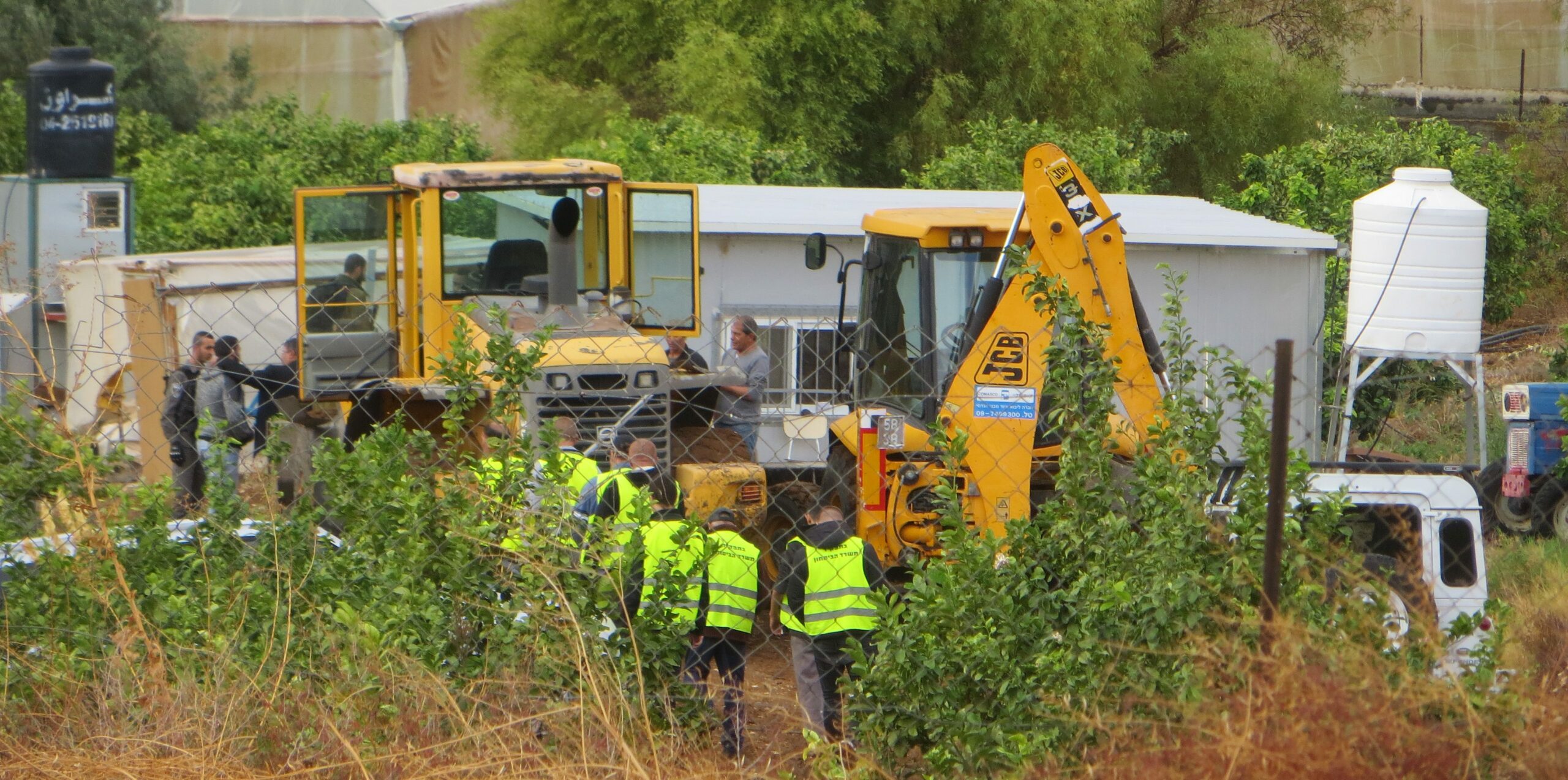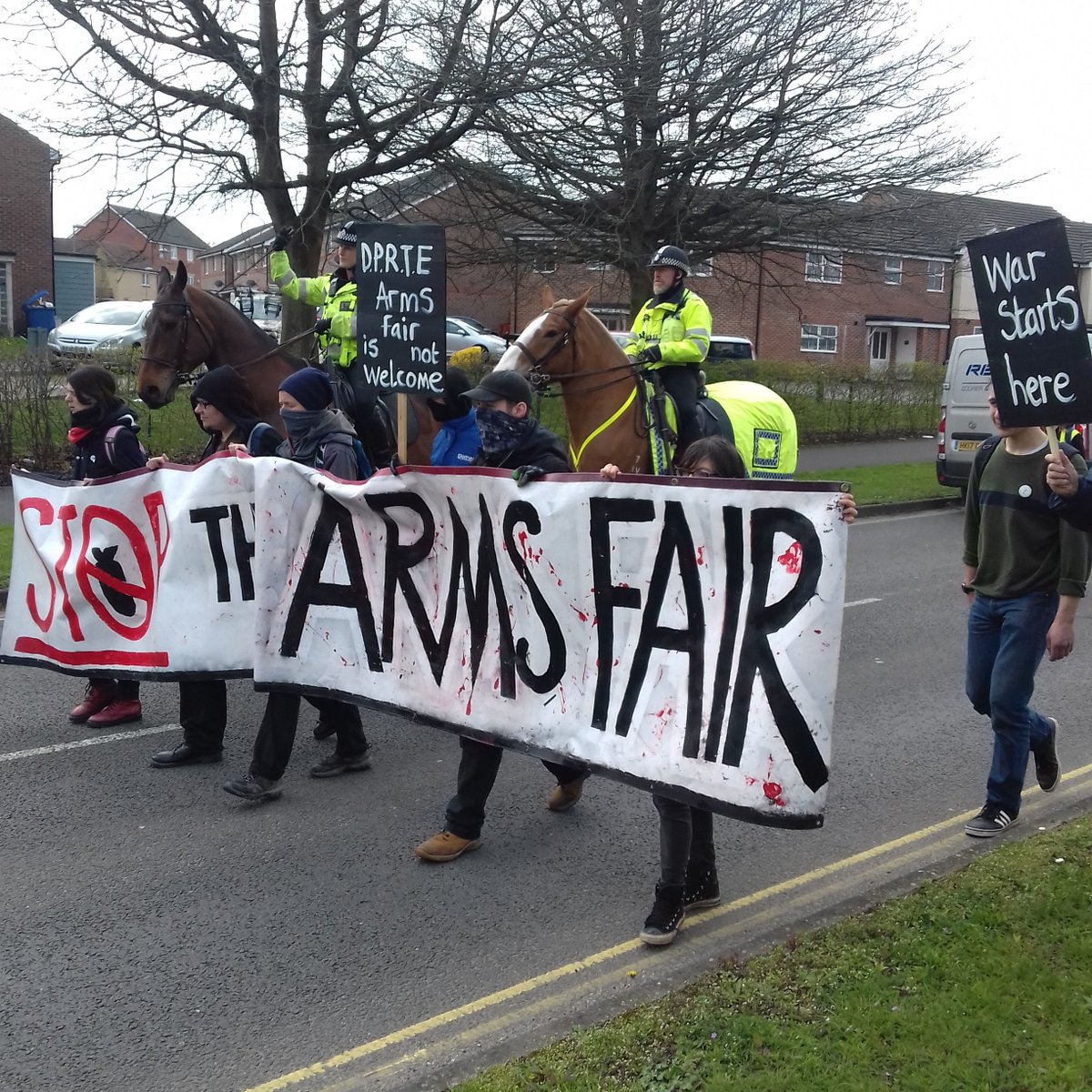By Eliza Egret
Once again, Docklands’ ExCeL Centre will host the DSEI (Defence and Security Equipment International) arms fair next month. 1,600 exhibitors will showcase equipment including drones, tanks, guns, bombs, warships, crowd control weaponry and covert surveillance equipment.
They will be hoping to secure contracts and wine and dine with international governments and military personnel, aiming to profit from states’ unending wars of aggression around the world. The arms fair is subsidised by the UK taxpayer, and DSEI’s organisers work closely with the government, welcoming human rights abusers such as Saudi Arabia, the US, Israel and Turkey.
DSEI is always heavily fortified and policed, ensuring that arms companies and aggressive regimes can make deals with total impunity.
Quakers, Catholic Workers, anarchists, socialists, trade unionists and Buddhists are just some of those who have come together to protest DSEI, which takes place every two years. In recent years, British anti-militarists have been joined by activists from Bahrain, Yemen, Egypt, Kurdistan and other communities directly affected by war and state violence.
Creative resistance
Activists have been resisting the arms fair since its inception in 1999, when it was held in Chertsey, Surrey. That year, mass blockades of the roads took place in an attempt to prevent the arms dealers from getting to the event. In 2001, DSEI was moved to the ExCeL Centre in London’s Docklands. As planes crashed into New York’s World Trade Center, protesters demonstrated against profiting from war.
Anti-militarist activist Sam Hayward first attended protests against DSEI in 2003, at the height of the anti-Iraq war movement. ‘That year, millions of people were involved in the opposition to the invasion of Iraq,’ Sam says. ‘When the war began it wasn’t clear how to oppose it and many anti-militarist activists fell away, not knowing what to do. I started thinking about how imperialist wars couldn’t happen without the weapons being manufactured and sold by the arms companies — beneficiaries of aggressive imperialist wars.’
One tactic at DSEI 2003 was to stop the arms dealers from getting to the ExCeL Centre. Sam explains how this happened:
‘Activists climbed onto the roofs of DLR trains and locked themselves on, stopping the trains. As a result, the arms dealers were brought in on buses. Protesters stopped the buses, laying down in front of them. Delegates started arriving by taxi and on foot, so people blocked the roads. There were thousands of activists involved. It was successful in delaying the arms dealers getting there, but ultimately the arms fair still took place.’
Similar actions against the DLR trains took place in 2005. Activist Gary White believes that this has been ‘the most effective form of action, as it prevented arms traders from using the train to get to ExCeL. But it was very contentious with the local anti-arms trade group because they regarded it as unhelpfully disrupting the community. It also resulted in many hours of community service sentences.’
Since DSEI began, anti-militarists have used a variety of creative tactics to raise awareness of the effects of war. The water in Hyde Park’s fountains has been dyed red, symbolising the blood of those killed by cluster bombs. Activists have also performed street theatre, and there have been numerous ‘die-ins’ outside the ExCeL Centre, with people laying on the ground covered in fake blood. In 2007, the group Space Hijackers drove a tank to DSEI, theatrically auctioning it off to the highest bidder. In 2015, adverts on the tube were creatively ‘subvertised’.
Arms dealers have been greeted by smartly-dressed activists at City Airport, who gave them incorrect directions to DSEI. One year, comedian Mark Thomas stood outside a hotel, persuading arms dealers to board his free bus to DSEI. He then drove them away, giving them a lecture about the evils of the arms trade.
Bikes Not Bombs critical mass bike rides have been used not only to gain public attention, but also as a tactic to blockade the gates of the exhibition.
Protest hasn’t been confined to the ExCeL Centre. Arms companies — and investors in the arms trade — have had their offices and factories targeted with protests, occupations, lock-ons and banner drops. The organiser of DSEI, Clarion Events, has also been met with protests.
In 2011, anti-militarists rowed kayaks into the path of a battleship travelling down the river Thames. HMS Dauntless was to be used as a reception area to greet the arms dealers and display weapons. The kayakers let off a smoke flare to alert the ship that they were there. Gary White explains the action:
‘Four of us launched inflatable kayaks from a hidden spot in the Thames, so we were on our way before the river police spotted us. The ship was equivalent to about three storeys tall. The plan had been to unfold a banner between the kayaks in its path but we didn’t get the chance. The police grabbed all of us bar one.’
Nonetheless, Gary says that the action was successful. ‘Battleships entering the Royal Victoria Dock are dependent on the tide, so HMS Dauntless only had a small window of opportunity. The intention was to stop it from using that window, so in that sense the action was effective. It was also the first action of that year’s protests and enthused everyone else!’
Since 2011, various activist groups have joined together in their resistance to DSEI and have formed the Stop The Arms Fair coalition. In 2013, it changed tactics, and is now targeting the setting up of the arms fair in the week prior to the event in an attempt to block the weaponry from arriving at the ExCel Centre to begin with.
Police protect the arms fair
While arms deals are done at DSEI without being monitored, demonstrators are often met with heavy policing. In 2005, campaign group Disarm DSEI occupied a disused school in the local area, to be used as a convergence centre.
‘The government had brought in a succession of repressive laws and they expanded the police’s powers to prevent public assemblies and criminalise protest under the Public Order Act,’ activist Sam Hayward says. The Blair government had previously changed the law so that the number of people who can constitute an illegal gathering was decreased from twenty people to two.
‘Using the supposed threat of terrorism as a rationale, police have mis-used their powers under the Terrorism Act of 2000,’ Sam continues. ‘They searched people, took their details and photographed them simply for being at the convergence centre or going to a protest.’
Penny Quinton, who was stopped at DSEI under the Terrorism Act in 2003, appealed the police’s power to stop and search her and eventually won her case years later at the European Court of Human Rights.
The arms fair on trial
During DSEI 2013, the mainstream media reported that torture weapons were being promoted for sale by Chinese company Tianjin MyWay and French company Magforce International. ‘As ever, the state refused to investigate the actions of the arms companies, despite their clear admissions of fact made in public statements to the mainstream press and on their own media,’ activist Susannah Mengesha says. ‘The arms trade operates entirely unaccountably in the UK with the total protection and support of the state.’
Following legal advice, she joined other activists to commence private prosecution proceedings against the two arms companies.
‘We were clear from the outset that our intention was never to “clean up” the arms fair, since we also oppose the sale of arms for corporate profit,’ Susannah adds. ‘But we felt that it would be a unique opportunity to hold these arms companies to account for their actions. We also felt that the case would highlight the true grubby nature of DSEI and the arms trade, which is designed to torture, maim and kill.
‘The case progressed well and was listed for trial. However, out of nowhere our lawyers were called into a private meeting with a very senior deputy director at the CPS, who said that our case could not proceed without the express permission of HMRC or other specific functionaries. So our case was forcibly stopped by the state.’
During the set-up of the following DSEI in 2015, Susannah was arrested for ‘obstructing the highway’ as she and one other woman locked themselves by the necks to the gates of the ExCeL Centre using bicycle D-locks. She explains about the trial: ‘We pleaded not guilty on the basis that we were acting to prevent greater crimes. During the trial we called expert witnesses from international NGOs to describe the catalogue of wrongdoing at the arms fair. Their evidence included repeated incidents of the promotion for sale of “illegal” weapons at DSEI, such as torture weapons, cluster munitions and landmines.
‘They also gave evidence about how “lawful” weapons sold at the fair would likely be used to commit war crimes in places such as Yemen, Bahrain, Palestine and Kurdistan. The activists also gave personal testimony about their convictions and their own individual experiences of repression and war.’
The district judge acquitted the eight defendants. He stated that there was ‘clear, credible and largely unchallenged evidence from the expert witnesses of wrongdoing at DSEI and compelling evidence that it took place in 2015’.
The CPS applied to the High Court to re-open the case and judicially review the magistrates’ decision to acquit the activists. ‘They did not dispute any of the factual evidence presented to the court as to wrongdoing by the arms fair,’ Susannah says. ‘Rather, they argued that this evidence should not have been allowed to be heard.’ Their appeal was, in part, successful, although the court ruled against retrying the defendants.
Stop DSEI reaching its twentieth year
2017 will be the eighteenth year that DSEI takes place. Activists are keen not to let it reach its twentieth year, and there is renewed enthusiasm as anti-militarism strengthens in numbers once again, with new people getting involved. Protesters are particularly enthusiastic about the tactic of attempting to block the setting up of the fair before it starts.
‘What really enthuses me is the coming together of different groups and the joining up of struggles,’ says Susannah. ‘The arms trade does so much harm to so many. Its role is clear in perpetuating internal repression, apartheid and wars across the globe… For me as a Londoner it is intolerable to remain inactive. I feel deeply compelled to do something practically to stop it. I would urge anyone that can make it to join us in trying to stop DSEI, because it is literally a matter of life or death.’
Join the protests against DSEI from 4-11 September. Go to Stop The Arms Fair to find out how to join the protests. @Stopthearmsfair #StopDSEI
Some of the names of activists have been changed in this article.



0 Comments